
Challenge-Based Learning Visuals
This page visually illustrates different implementations of CBL at DCU. While all CBL experiences broadly have common factors (e.g. the three phases of Engage, Investigate and Act), each implementation is different in terms of how the challenges get sourced, the number of stakeholders/partners, the frequency of interaction with them and what particular angle the challenge gets framed by and what tools are employed to develop solutions, etc. The graphics on this page attempt at visually capturing these common and unique characteristics of CBL, offering an insight into a varied range of CBL implementations.
The background to this project is discussed further in the case study Can a Picture Paint a Thousand Words? Visualising Variety in Challenge-Based Learning (Gormley et al., 2025).
Policy Challenges
In this case, challenges are proposed by multiple potential challenge providers who are civil society organisations and public bodies only (not private or professional bodies). Challenges must be 'real-world' authentic challenges addressing significant societal issues e.g economic decline of city centre; housing issues; renewable energy. Students select the challenge of most interest to them and work with the challenge provider for potential source materials and data. Students also work with academics and the challenge provider to refine the scope of the challenge. They are given a specific research tool (i.e Rapid Evidence Assessment Tool) to investigate the challenge while challenge providers answer questions and provide feedback throughout. Students ultimately co-develop actionable solutions such as policy recommendations and potentially share solutions in public.
Educator's Perspective
Programme: MSc in Public Policy
Module Co-ordinator: Prof. Deiric Ó Broin
School: School of Law & Government
Faculty: Humanities & Social Sciences
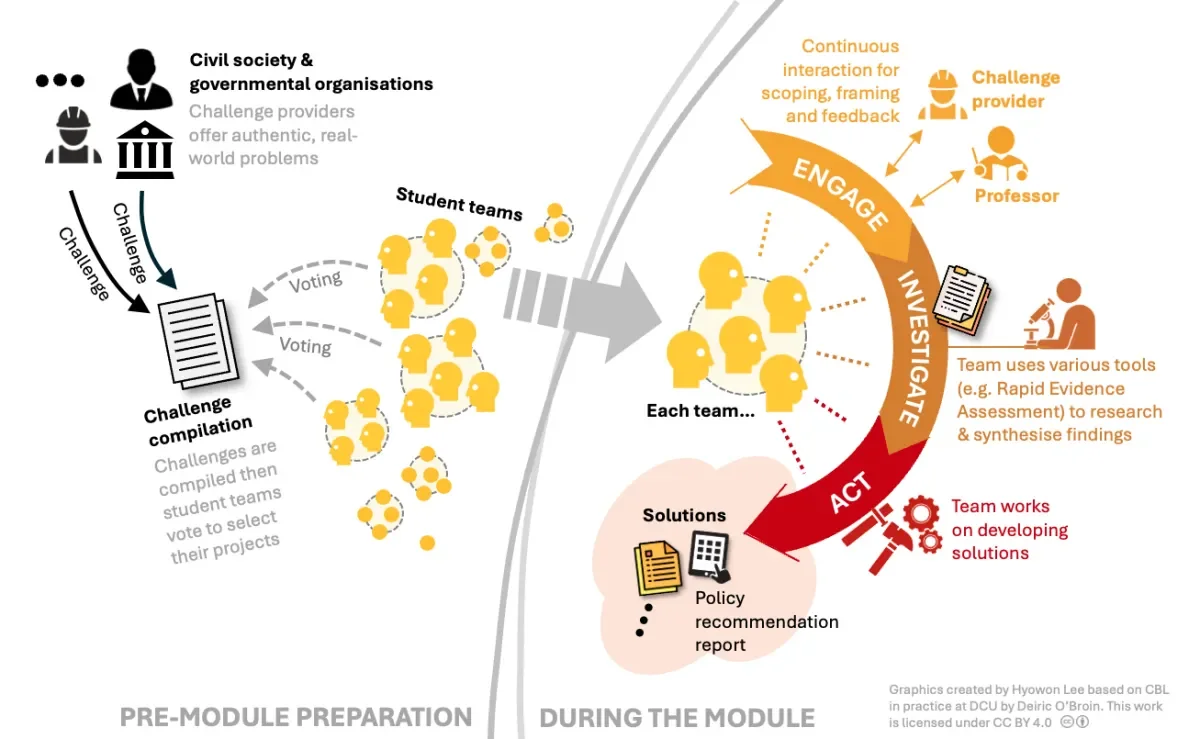
The EcoTech Challenge: Pioneering Innovative Technologies for a Sustainable Future
This module had Uisce Éireann, the Irish Water Utilities Company, as the main external stakeholder who provided the initial challenge ("Foster a culture of diversity and inclusion") to student teams and offered valuable feedback throughout. 28 students from 5 countries came together through DCU & ECIU to tackle a critical sustainability issue: ensuring that clean, safe water reaches those who need it most, especially when supply is at risk. Students were tasked with:
- Identifying barriers that might be preventing eligible households from accessing additional supports
- Exploring strategies to increase awareness and demand for these services
- Recommending additional services to provide better support for these individuals through a more diverse and inclusive lens
Formative feedback from multiple sources helped to steer each team's progress. Student recommendations were included in a proposal to the national regulator, influencing potential changes across other essential utilities serving the public.
Educator's Perspective
Programme: BSc Digital Business and Innovation
Module Co-ordinator:
Dr. Cliona McParland
School: School of Business
Faculty: DCU Business School
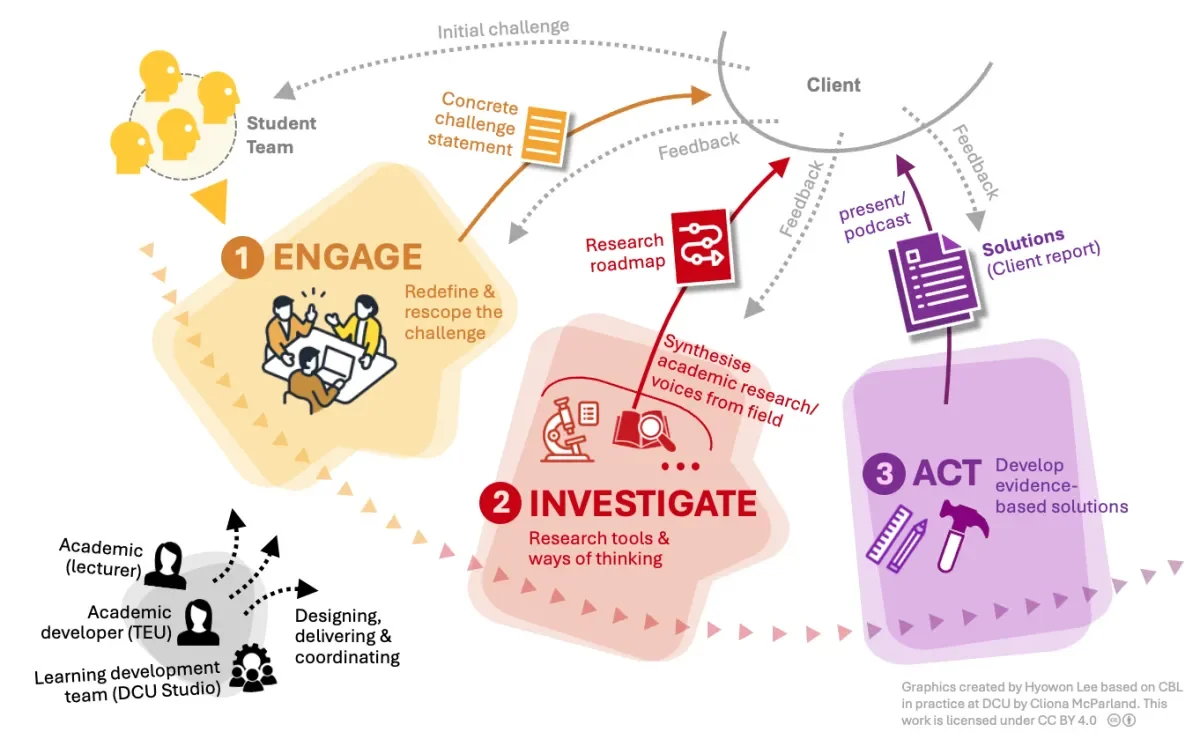
Professional Learning Event - Hackathon on Active Learning
This was a hackathon-based professional learning event that was organized and run in CBL mode. Through the format of a hackathon – an intense, time-bound event where people collaborate in teams to solve challenges – approximately 40 participants worked in small groups to investigate and co-develop potential solutions to issues of passive, predictable teaching. Throughout this one-day activity, staff, students, and mentors came together to tackle the overarching challenge of 'Activating Active Learning' while simultaneously experiencing CBL in action.
The key aspects were: (1) Participants were staff from diverse departments and faculties in DCU; (2) pedagogical and technological experts from the TEU and Teaching & Learning Centres in other Irish universities served as mentors/external stakeholders; (3) Challenges related to active learning and the sub themes of Education for Sustainable Development, Generative AI, and digital transformation. Prizes were given to promote participation and reflection, and the hackathon ended with short presentations of proposed recommendations from each of the six participating teams.
Educator's Perspective
Facilitators: Ms. Prajakta Lily Girme & Ms. Clare Gormley
Unit: DCU Teaching Enhancement Unit (TEU)
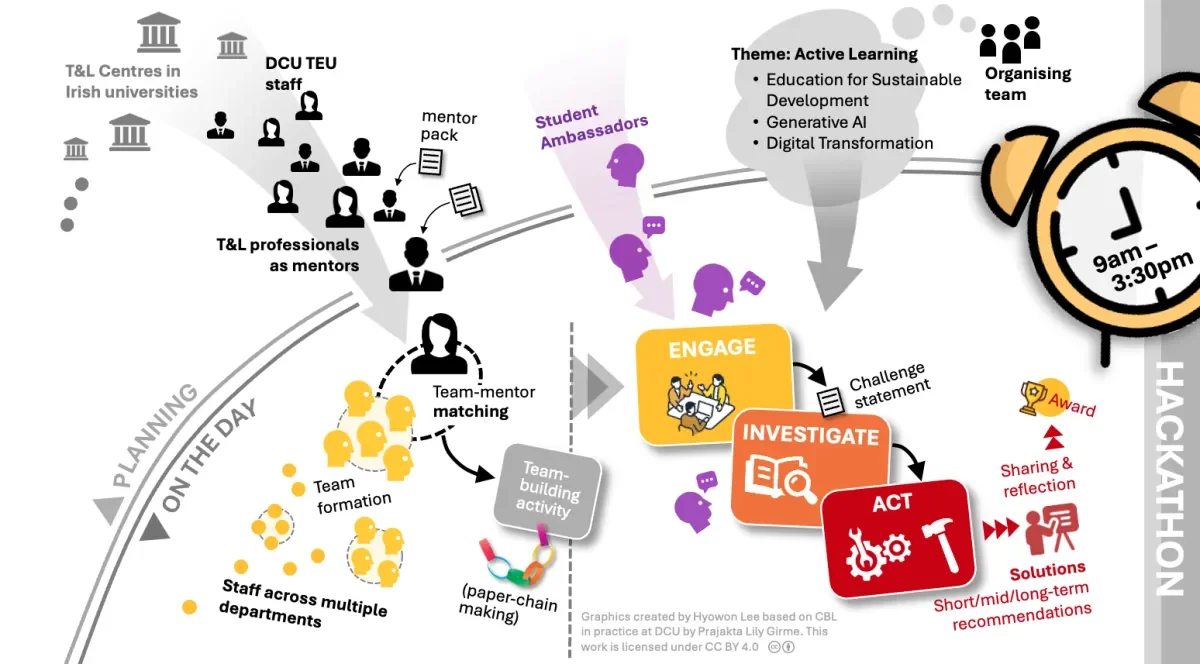
Sustainability & Geography Education
The Irish Children and Young People's Assembly on Biodiversity Loss proposed a series of 'Calls to Action' to address biodiversity loss. The challenge for undergraduate teacher education students in this module is to develop an educational response to these calls.
During the Engage phase, students co-develop enquiry questions concerning content knowledge (what do I need to know about biodiversity and biodiversity loss?) and pedagogical knowledge (how can I teach about biodiversity loss?) relevant to the challenge. During the Investigate phase, students undertake a comprehensive process of locating and gathering data from different sources e.g. Biodiversity officers from local authorities and. During the Act phase, students make sense of the information gathered and design their own response to some element(s) of the 'Calls to Action'. Each group presents their response, first to smaller peer groups, then to a larger audience. Students critically reflect on the process of their learning, the geographical enquiry, and wider challenge-based learning.
Educator's Perspective
Programme: BA in Climate and Environmental Sustainability
Module Co-ordinator:
Dr. Benjamin Mallon
School: School of STEM Education, Innovation & Global Studies
Faculty: DCU Institute of Education

Accounting for Sustainable Business
This CBL group project for Year 2 undergraduate students had an overall scenario in which student teams were hired as consultants to support a DCU campus business to become a more sustainable business. The challenge therefore has a management accounting focus for sustainable business. The management team asked students to identify three strategic sustainability priorities and to prepare a report on how these issues can be integrated into the organisation's planning, control and decision-making systems. Students were asked to ensure that the three strategic sustainability priorities included at least one social and one environmental issue. Five DCU entities/partners/businesses acted as external stakeholders and provided real and authentic feedback throughout the project. There were over 100 students involved in the most recent iteration. Assessment was done through through videos, reports, and peer-to-peer Q&A and is worth 40% of the module overall. There has also been some sponsorship and prizes for top projects.
Educator's Perspective
Programme: BA Accounting & Finance
Module Co-ordinator:
Dr. Aideen O'Dochartaigh
School: School of Business
Faculty: DCU Business School
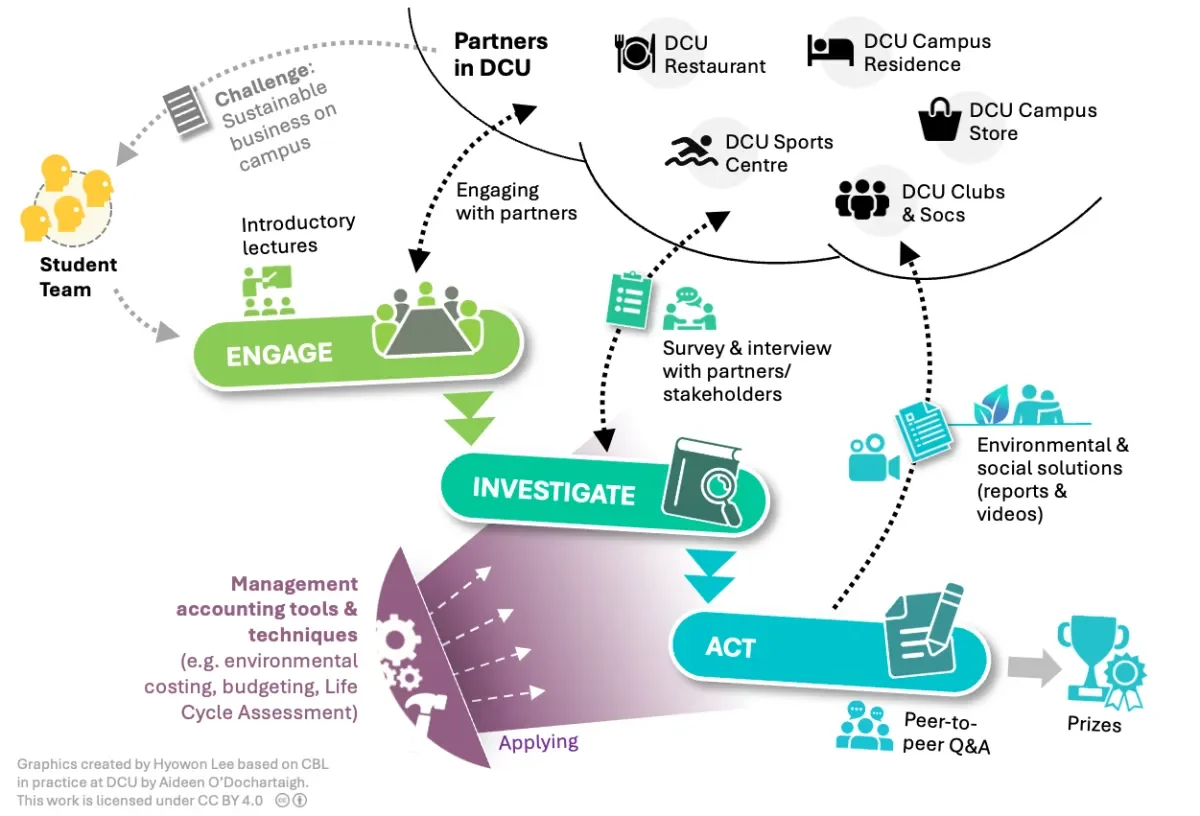
ENI1012 LIFE module
This example shows a First Year student's perspective of an introductory CBL project. The external stakeholder was Applegreen. Their Managing Director visited the classroom to present a focused challenge: develop an innovative product or operational solution that addresses rising business costs, while maintaining and enhancing the company's commitment to delivering exceptional roadside hospitality. Student teams went through the CBL stages to understand the challenge, identify/refine a specific problem, followed by developing a solution. They conducted primary research at Applegreen stores, including conducting surveys. The next step was to analyse the gathered data as well as conduct further research into trends and any other necessary secondary information. Eventually, this process led to the team agreeing on an idea that was an effective solution to the problem identified through research. Finally, the team compiled the research, developed the idea, completed a detailed report of the innovation challenge, and paired it with a prototype through the use of a storyboard to illustrate the innovation in a creative way.
Student's Perspective
Programme: BSc in Digital Business and Innovation
Module Co-ordinator: Dr. Catherine Faherty
School: School of Business
Faculty: DCU Business School
Student: Mr. Anthony Downes
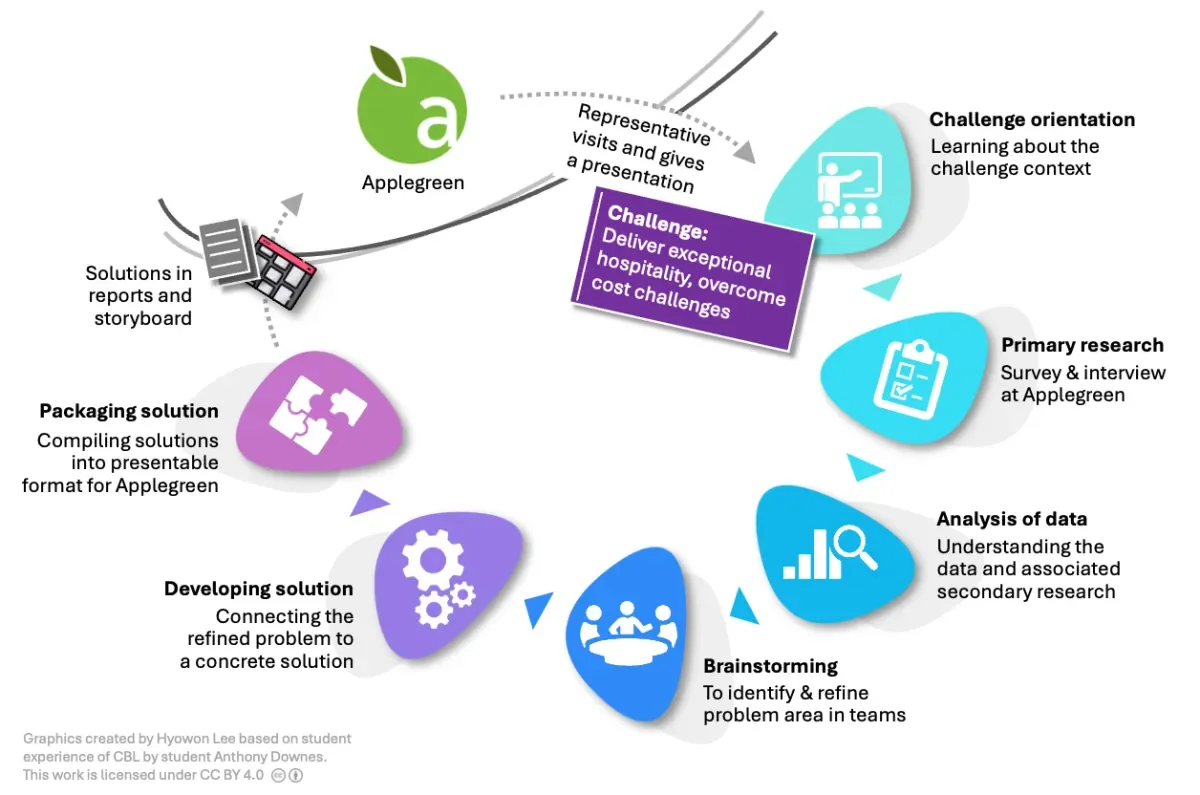
CBL Working Group
Dublin City University 2025
Reference
Gormley, C., Lee, H., Ó Broin, D., McParland, C., Girme, L., Mallon, B., O'Dochartaigh, A., and Downes, A. (2025) "Can a Picture Paint a Thousand Words? Visualising Variety in Challenge-Based Learning," Irish Journal of Academic Practice: Vol. 13: Iss. 1, Article 12. Available at: https://arrow.tudublin.ie/ijap/vol13/iss1/12
